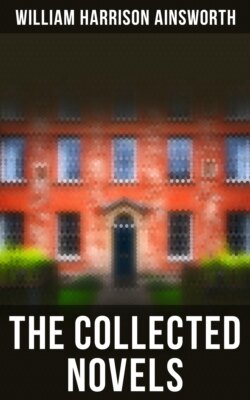Читать книгу The Collected Novels - William Harrison Ainsworth - Страница 59
На сайте Литреса книга снята с продажи.
CHAPTER 11
THE BRIDAL
ОглавлениеTable of Contents
Cari. I will not die; I must not. I am contracted To a young gentleman.
Executioner. Here’s your wedding-ring.
Duchess of Malfy.
Slowly did the train descend; solemnly and in silence, as if the rites at which they were about to assist had been those of funereal, and not of nuptial, solemnization. Indeed, to look upon those wild and fierce faces by the ruddily-flashing torchlight, which lent to each a stern and savage expression; to see those scowling visages surrounding a bride from whose pallid cheeks every vestige of color, and almost of animation, had fled; and a bridegroom, with a countenance yet more haggard, and demeanor yet more distracted — the beholder must have imagined that the spectacle was some horrible ceremonial, practised by demons rather than human beings. The arched vault, the pillars, the torchlight, the deep shadows, and the wild figures, formed a picture worthy of Rembrandt or Salvator.
“Is Sybil within the chapel?” asked Barbara.
“I am here,” returned a voice from the altar.
“Why do we tarry?” said the gipsy queen. “We are all assembled. To the altar.”
“To the altar!” shrieked Eleanor. “Oh! no — no ——”
“Remember my threat, and obey,” muttered Barbara. “You are in my power now.”
A convulsive sob was all the answer Eleanor could make.
“Our number is not complete,” said the priest, who had looked in vain for the sexton. “Peter Bradley is not with us.”
“Ha!” exclaimed Barbara. “Let him be sought for instantly.”
“Their search need not extend beyond this spot,” said Peter, stepping forward.
The knight of Malta advanced towards the altar. The torchlight reddened upon the huge stone pillars. It fell upon the shrine, and upon the ghastly countenance of Sybil, who stood beside it. Suddenly, as the light approached her, an object, hitherto hidden from view, was revealed. Sybil uttered a prolonged and fearful shriek; the knight recoiled likewise in horror; and a simultaneous cry of astonishment burst from the lips of the foremost of the group. All crowded forwards, and universal consternation prevailed amongst the assemblage. Each one gazed at his neighbor, anxious to learn the occasion of this tumult, and vague fears were communicated to those behind, from the terrified glances, which were the only answers returned by their comrades in front.
“Who has dared to bring that body here?” demanded Barbara, in a tone in which anger struggled with apprehension, pointing at the same time to the ghastly corpse of a female, with streaming hair, at the altar’s feet. “Who has dared to do this, I say? Quick! remove it. What do you stare at? Cravens! is this the first time you have looked upon a corpse, that you should shrink aghast — that you tremble before it? It is a clod — ay, less than a clod. Away with it! away, I say.”
“Touch it not,” cried Luke, lifting a cloud of black hair from off the features; “it is my mother’s body.”
“My daughter!” exclaimed the sexton.
“What!” vociferated Barbara, “is that your daughter — is that the first Lady Rookwood? Are the dead arisen to do honor to these nuptials? Speak! you can, perchance, explain how she came hither.”
“I know not,” returned Peter, glancing fiercely at Barbara; “I may, anon, demand that question of you. How came this body here?”
“Ask of Richard Checkley,” said Barbara, turning to the priest. “He can, perchance, inform you. Priest,” added she, in a low voice, “this is your handiwork.”
“Checkley!” screamed Peter. “Is that Richard Checkley? is that ——”
“Peace!” thundered Barbara; “will none remove the body? Once more I ask you, do you fear the dead?”
A murmur arose. Balthazar alone ventured to approach the corpse.
Luke started to his feet as he advanced, his eyes glaring with tiger fury.
“Back, old man,” cried he, “and dare not, any of you, to lay a sacrilegious finger on her corse, or I will stretch him that advances as lowly as lies my mother’s head. When or how it came hither matters not. Here, at the altar, has it been placed, and none shall move it hence. The dead shall witness my nuptials. Fate has ordained it —my fate! o’er which the dead preside. Her ring shall link me to my bride. I knew not, when I snatched it from her death-cold finger, to what end I preserved it. I learn it now. It is here.” And he held forth a ring.
“’Tis a fatal boon, that twice-used ring,” cried Sybil; “such a ring my mother, on her death-bed, said should be mine. Such a ring she said should wed me ——”
“Unto whom?” fiercely demanded Luke.
“Unto Death!“ she solemnly rejoined.
Luke’s countenance fell. He turned aside, deeply abashed, unable further to brook her gaze; while in accents of such wildly touching pathos as sank into the hearts of each who heard her — hearts, few of them framed of penetrable stuff — the despairing maiden burst into the following strain:
